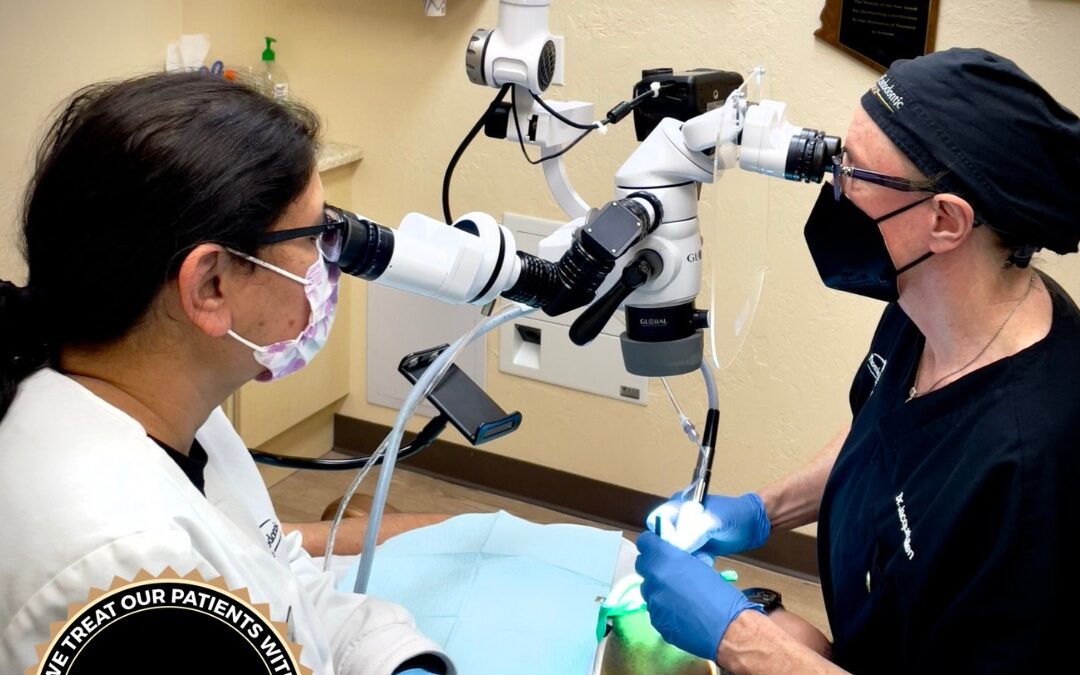
by Dr. Jacqueline S. Allen | Feb 10, 2020 | Blog, Endodontist, Phoenix Endodontic Group, Root Canal
Dr. Jacqueline Allen is qualified to utilize the minimally invasive Waterlase™ to treat dental conditions with less discomfort to the patient and in some cases use less to no anesthetic. Dr. Allen completed the advanced endodontics continuing education with Dr. William Chen, at the Chen Laser Institute. The course provided in depth training for laser-assisted endodontics to help meet many of the toughest clinical challenges and techniques on single and multiple root canal therapy using the laser, among other advanced endodontic techniques.

Waterlase Dentistry uses laser energy and a gentle spray of water to perform a wide range of dental procedures — without the heat, vibration, and pressure associated with the dental drill, and in many cases without the blood of a traditional scalpel. Dr. Jacqueline Allen offers Waterlase™ treatments to patients who would prefer to receive the latest laser treatment as an alternative to more traditional oral surgery methods.
Those who suffer from anxiety due to past dental experiences or fear of needles are more likely to feel calm and relaxed when receiving treatment with the gentle Waterlase™ system, with many patients reporting no or less pain, and many cases of fewer shots. Laser-based dental care has also been shown to cause less swelling and bleeding at the treatment site. Patients have been shown to recover more quickly, with faster healing, with the use of Waterlase, making dental care a much more convenient and pleasant experience.
Patients who are interested in making an appointment with an endodontist in Phoenix, AZ., who utilizes laser technology to treat oral problems are invited to schedule an appointment with Dr. Allen’s office at their convenience. To learn more about this cutting-edge dentistry technology visit biolase.com.

by Dr. Jacqueline S. Allen | Nov 20, 2019 | Blog, Root Canal
Although fewer Americans fear root canals than in previous generations, anxiety about the procedure can still be significant enough for many with an infected or damaged tooth to put off visiting an endodontist to be evaluated. They may hope that their symptoms go away on their own, or that home remedies will help them avoid a root canal.
Unfortunately, if your tooth’s pulp has been compromised, it is unlikely putting off a root canal will improve the situation. In fact, the reverse is actually true: the sooner you visit your endodontist, the more quickly your symptoms and the risk to your oral health will subside.
 The Bad News: What Happens If You Don’t Get A Root Canal
The Bad News: What Happens If You Don’t Get A Root Canal
The following are potential outcomes if you ignore symptoms that indicate a root canal is needed, which can include a pimple on your gumline, a discolored tooth, pain when chewing with the affected tooth, and prolonged sensitivity to hot and cold foods.
- Your tooth pain will continue and probably get worse. If infection has reached your tooth’s pulp, which contains nerve fibers, that awful ache will not disappear on its own.
- The infection in your tooth could spread and cause a health emergency. Untreated dental infections in the roots of your teeth can cause abscesses and also spread throughout the body, including into the brain in rare cases.
- The nerves in your tooth could die, making it harder to know what’s happening inside your tooth. Yes, the pain might go away if you put off treatment long enough, but what has likely happened is that the nerves inside the impacted tooth are dead, while the infection is still there, even if you cannot feel it.
- You could reach a point where extracting the tooth is your only option. Endodontists can frequently save natural teeth with a root canal, even ones with extensive damage or infection, but some teeth become too structurally fragile to save. Extraction will remove the immediate source of your problem, but it creates new problems. Other teeth can shift to fill the space in your mouth, and chewing and speaking can become more difficult without restorations such as bridges, dentures or implants.
“The good news for patients with symptoms indicating they may need a root canal is that the procedure is safer, easier and more effective than ever,” says Dr. Allen, who practices with the Phoenix Endodontic Group. “Don’t hesitate to call our office for a consultation so we can treat your tooth as soon as possible.”
by Dr. Jacqueline S. Allen | Sep 20, 2019 | Blog, Endodontics, Endodontist, Root Canal
Millions of root canals are performed successfully each year. However, concern persists in some circles that instead of relieving a health problem – an infected or injured tooth – root canals cause illness. While there is no evidence to support this idea, rumors of the “dangers of root canal therapy” continue.
The American Association of Endodontists and other dental professionals are frequently asked by patients about the safety of root canals. Practitioners are happy to explain the root canal process and why root canals are the treatment of choice for preserving your natural teeth.
Root Canals And Health Problems: The Facts
- The primary research cited linking root canals to health problems is nearly a century old. Weston Price hypothesized in the early 1900s that bacteria trapped in a tooth treated by root canal caused diseases ranging from arthritis to heart disease. Needless to say, research methods and theories of disease causation were less advanced then; even studies conducted as early as the 1930s and 1940s indicated that there was no relationship between having a root canal and contracting a disease.
- Current research findings reinforce that root canals neither cause nor are correlated with other health challenges. In fact, a 2013 study in a publication by the American Medical Association noted that not only did root canals not cause cancer of any type, patients who had undergone multiple endodontic treatments had a 45 percent reduction in their cancer risk.
- Modern root canal treatment is safe and effective. With success rates of more than 90 percent, root canals have become reliable procedures for saving natural teeth. Digital imaging tools, advances in canal cleaning instruments, and the emergence of powerful disinfectants have all contributed to the ability of endodontists to save even seriously compromised natural teeth.
“There is a huge body of evidence demonstrating root canals are not associated with other health problems,” says Dr. Allen, who practices with the Phoenix Endodontic Group. “Your peace of mind is a top concern to us, of course, and we are happy to discuss why root canals are the best option for most people to save their natural teeth.”
by Dr. Jacqueline S. Allen | Jul 15, 2019 | Blog, Endodontics, Phoenix Endodontic Group, Root Canal
If you are referred to an endodontist for a root canal, you may be surprised to learn that, as critical as the procedure is to saving your natural tooth, you will also need a second procedure to ensure its long-term success. Most of the time, your endodontist will recommend placing a crown on the tooth with the root canal. To understand why, it is helpful to review what root canal treatments do and the after-care needed to support them.
Why Teeth Treated With Root Canals Need Crowns
- A root canal replaces your tooth’s nerve pulp with a biocompatible material. This substitution of gutta-percha or another biocompatible substance is what makes it possible to save your tooth, but it also makes the tooth more brittle. This means it can be more vulnerable to chipping or cracking.
- The infection or breakage that led to the need for a root canal may have permanently weakened the tooth. By the time a root canal is recommended, your tooth may have already sustained structural damage. A crown can cover your entire tooth above the root line and provide protection your natural tooth has lost.
- Previous dental work may have weakened your tooth. Dental fillings can fail and leave teeth prone to decay. Teeth on either side of a bridge may have been altered to hold the restoration in place. Other types of dental work can also reduce the strength of your teeth.
- Crowns can prevent coronal leakage. If the filling that seals in the biocompatible tooth root material develops a leak, infection can get in and ruin the root canal. Crowns are the best restoration to prevent this type of potential damage.
“Root canals regularly save natural teeth, and a root canal topped with a crown can allow that tooth to last as long as the rest of your teeth,” says Dr. Allen, an endodontist with the Phoenix Endodontic Group. “Our practice is happy to explain the importance of each step of the root canal process.”

by Dr. Jacqueline S. Allen | May 28, 2019 | Blog, Endodontics, Endodontist, Phoenix Endodontic Group, Root Canal
Determining whether you need a root canal or another type of dental treatment is usually handled by your general dentist or endodontist. You can avoid many complications by knowing the signs and symptoms indicating a root canal may be needed, and making an appointment to have your tooth examined.
Signs You May Need A Root Canal

Root canals are often the treatment of choice when a tooth has become injured or infected at a level impacting your dental pulp – the part of your tooth beneath the enamel and dentin layers, made up of blood vessels, nerves, and connective tissue.
There are many ways this part of the tooth can be injured:
- A chip or crack in the tooth lets bacteria into the pulp, causing infection
- Severe, untreated tooth decay or cavities
- Trauma to the face resulting in damage to your tooth’s structure
Sometimes teeth needing root canals show few symptoms and require diagnosis through careful examination by a dental professional using radiographs or other imaging techniques. It’s often apparent, though, when something is wrong with your tooth. Some of the symptoms that may call for a root canal include:
- A severe toothache that gets worse when you chew or apply pressure near the tooth
- Swelling and tenderness of the gums near the tooth
- Discoloration (usually darkening) of the tooth
- The tooth is sensitive to hot or cold temperatures, and discomfort remains after the source of the temperature change is gone
- A pimple on the gums that persists or keeps reappearing
If you experience any of these symptoms, call your general dentist or endodontist immediately.
“Recognizing the signs of damaged or infected teeth can save patients extra discomfort and ensure their root canal treatment begins early,” says Dr. Allen, an endodontist who practices with the Phoenix Endodontic Group.

by Dr. Jacqueline S. Allen | Apr 24, 2019 | Blog, Endodontics, Featured, Root Canal, Save Your Tooth Month
If you have a natural tooth compromised by infection or injury, you may believe that extraction is your only solution. However, many compromised teeth can be saved by endodontic treatments such as root canals or other more complex procedures. Endodontic practice groups across the nation will be celebrating Save Your Tooth Month in May. The event is sponsored by the American Association of Endodontists and is aimed at making people aware of their endodontic treatment options.
 How Endodontic Treatment Can Save Your Teeth
How Endodontic Treatment Can Save Your Teeth
Endodontic treatment can save natural teeth that might otherwise face extraction. Endodontists are well qualified to save your natural teeth because:
- They receive two extra years of specialty training after receiving their degree as a dentist.
- They learn how to perform root canals, apicoectomies, and other endodontic treatments.
- They focus their practice exclusively on endodontic treatment, performing as many as 25 root canals per week.
- They use techniques and special tools that are especially effective at saving natural teeth.
- They work closely with general dentists, so it is easy to get a consultation and referral if your tooth needs endodontic treatment to preserve it.
“Endodontists’ combination of advanced training, access to unique tools and techniques, and the frequency with which we deal with root canals and other forms of endodontic treatment provide our patients with comfort and peace of mind,” says Dr. Allen, who practices with the Phoenix Endodontic Group.







